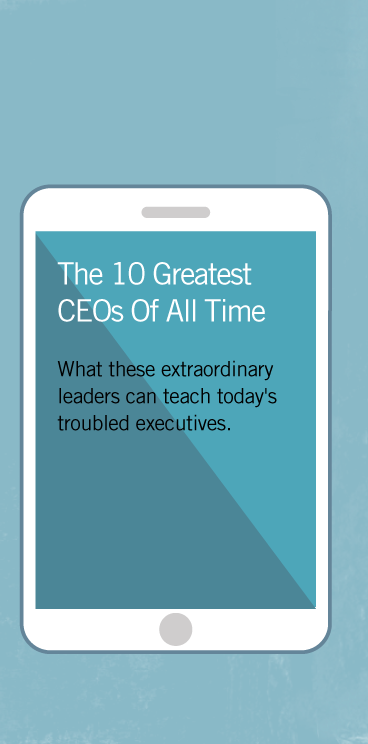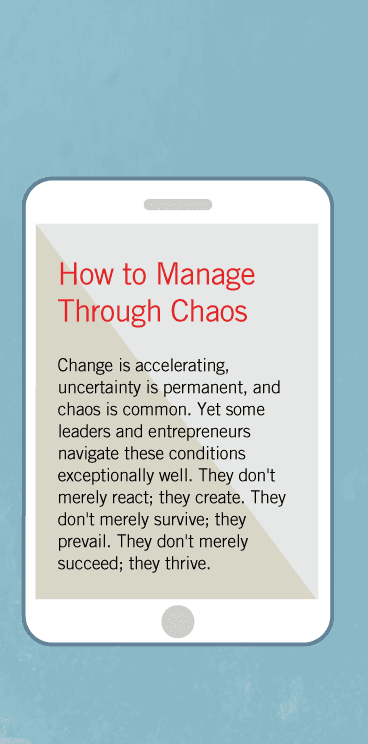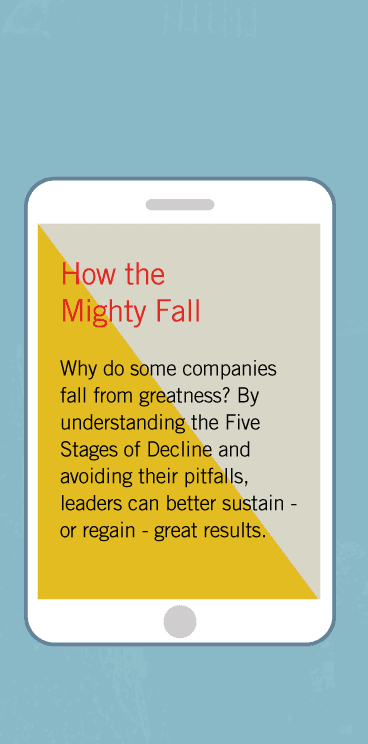Pulling the Plug
Inc.
March 1997
Entrepreneurs by their nature tend to be active, constantly doing,
going ever forward. That makes sense. Creating a great company requires
immense amounts of doing. Yet all that doing diverts us from an
equally important and powerful aspect of making progress: deciding
what to stop doing.
Most company builders ask what they should do to achieve their corporate vision. And that’s a good question because the ability to translate vision into consistent and concrete reality separates those who build substantial, lasting companies from mere visionaries. But I’m struck by how seldom company builders consider the question of what to stop doing, and how they fail to identify inconsistencies in their vision that should be eliminated.
The power of removal can be immense. A few years ago I set a goal of reading about 100 books a year. So I embarked on a vigorous program of doing. I made lists. I set aside a room as a library. I bought reading chairs, desks, lamps, and stacks of books.
Yet in spite of all that energetic doing, too many of the books remained unread. After a tiring day I’d get sidetracked. In my left hand, War and Peace; in my right, the TV clicker. Faced with long passages on the burning of Moscow in 1812 or short quips on Monday Night Football, I’d flick on the TV and lose a couple of hours. So my wife and I unplugged and jettisoned the TV. My reading productivity soared.
Before company owners embark on a blind fury of new initiatives, they ought to figure out what TVs to unplug. One key decision about what to stop doing might have as much impact as five new initiatives. For example, one company I know wanted to reduce cash-flow problems and increase speed by improving its inventory management. So it started a blizzard of initiatives to reduce work-in-progress inventory. Yet it still fell far short of its objectives. Finally, its management team paused to ask, "If all these initiatives haven’t helped us make our goal, what do we need to remove? The warehouse!" If the company simply shut down the warehouse on a specific date, the managers would have to figure out a way to reduce inventory, because otherwise it would pile up on the lawn. “Dependence on the warehouse distracted us from our goal,” the plant manager said. “Only when we removed it did we see a dramatic improvement.”
Bruce and Steve Woolpert, copresidents of Granite Rock, in Watsonville, Calif., understand the importance of figuring out what to stop doing. When they assumed executive responsibility of Granite Rock, in 1987, they set out to create a company unparalleled in its respect for and development of people. And, yes, they put in place lots of new initiatives to achieve this vision. But they also made key decisions about what to stop doing. For example, they stopped doing performance evaluations. In Bruce Woolpert’s view, performance evaluations are inherently destructive and unfair: they look backward rather than forward and destroy empowerment by reinforcing that “the boss is indeed the boss.” By unplugging the demoralizing annual-review process, Granite Rock managers could focus their energy on the ways people at the company could attain skills and achieve personal growth. Leave the performance review in place and you get cynicism about the stated vision; unplug it and you get people saying, “Hey, they really mean it.”
Ever wonder how companies like 3M and Motorola grew from small innovative companies into large ones? Partly by practicing the discipline of removal. Indeed, the key to 3M's success lies not in its ability to generate a plethora of new opportunities but in the fact that 3M people can say without penalty, "Hey, that's not such a good idea after all; let's unplug it and move on to something else," thus continually freeing resources for the most promising new opportunities. In a bold removal, Motorola jettisoned its television business at the height of its success in the 1960s. To fill the vacuum, it sought out exciting new fields, such as microprocessors and cellular communications. Instead of milking cash cows, Motorola slays them.
The point isn’t whether or not your company should milk cash cows. Or give performance evaluations. Or have warehouses. The point is that your company should remove inconsistencies in its vision, regardless of common business practices. Just because 99% of American households can't live without a TV doesn’t mean I should keep mine plugged in if it keeps me from achieving my vision.
You might ask yourself in what way you might be a TV that needs to be unplugged. Entrepreneurial companies often go from garage start-up to thriving companies precisely because their founders are Herculean doers. At later stages, however, a founder’s compulsive doing usually inhibits progress; founders who turn their entrepreneurial business into an enduring great company don’t continue with obsessive doing but rather impose upon themselves the demanding discipline of not doing. Glen Taylor, chief architect of Taylor Corp., a successful privately held stationery manufacturer in Minnesota, realized that his daily presence at his company in fact inhibited progress. In 1980 he unplugged himself for a while by running for the Minnesota Senate, where he served for 10 years. The company now has at least a dozen people who could assume the role of CEO at any moment. Taylor Corp. has an incredibly deep bench of executive talent because Glen Taylor knew when it was time to do less rather than more.
In a contrasting example, I watched one company grow from zero to $10 million in revenues almost overnight, based on the founder’s ability to create revolutionary products. Unfortunately, the company stalled out and was eventually acquired, because it never made the transition from being a company with an innovative founder to being an innovative company. The founder tried to solve the company’s problems by working extra hours on new products—in short, by more doing. Like Glen Taylor, he should have done less, which would have forced the company to become innovative independent of his genius.
Peter Drucker is fond of asking, "Which of your current businesses would you not enter if you were making a blank-page decision about it today?" Those you identify should be TVs to unplug. You should extend Drucker’s logic to every aspect of your company’s activities—people, products, systems, structures, and even how you spend your time. You should create a “stop doing” list to complement your “to do” list. Set aside time to explicitly discuss with your managers what to stop doing. The world is full of smart executives who take decisive action. It’s woefully short of wise executives who take decisive inaction.
Most company builders ask what they should do to achieve their corporate vision. And that’s a good question because the ability to translate vision into consistent and concrete reality separates those who build substantial, lasting companies from mere visionaries. But I’m struck by how seldom company builders consider the question of what to stop doing, and how they fail to identify inconsistencies in their vision that should be eliminated.
The power of removal can be immense. A few years ago I set a goal of reading about 100 books a year. So I embarked on a vigorous program of doing. I made lists. I set aside a room as a library. I bought reading chairs, desks, lamps, and stacks of books.
Yet in spite of all that energetic doing, too many of the books remained unread. After a tiring day I’d get sidetracked. In my left hand, War and Peace; in my right, the TV clicker. Faced with long passages on the burning of Moscow in 1812 or short quips on Monday Night Football, I’d flick on the TV and lose a couple of hours. So my wife and I unplugged and jettisoned the TV. My reading productivity soared.
Before company owners embark on a blind fury of new initiatives, they ought to figure out what TVs to unplug. One key decision about what to stop doing might have as much impact as five new initiatives. For example, one company I know wanted to reduce cash-flow problems and increase speed by improving its inventory management. So it started a blizzard of initiatives to reduce work-in-progress inventory. Yet it still fell far short of its objectives. Finally, its management team paused to ask, "If all these initiatives haven’t helped us make our goal, what do we need to remove? The warehouse!" If the company simply shut down the warehouse on a specific date, the managers would have to figure out a way to reduce inventory, because otherwise it would pile up on the lawn. “Dependence on the warehouse distracted us from our goal,” the plant manager said. “Only when we removed it did we see a dramatic improvement.”
Bruce and Steve Woolpert, copresidents of Granite Rock, in Watsonville, Calif., understand the importance of figuring out what to stop doing. When they assumed executive responsibility of Granite Rock, in 1987, they set out to create a company unparalleled in its respect for and development of people. And, yes, they put in place lots of new initiatives to achieve this vision. But they also made key decisions about what to stop doing. For example, they stopped doing performance evaluations. In Bruce Woolpert’s view, performance evaluations are inherently destructive and unfair: they look backward rather than forward and destroy empowerment by reinforcing that “the boss is indeed the boss.” By unplugging the demoralizing annual-review process, Granite Rock managers could focus their energy on the ways people at the company could attain skills and achieve personal growth. Leave the performance review in place and you get cynicism about the stated vision; unplug it and you get people saying, “Hey, they really mean it.”
Ever wonder how companies like 3M and Motorola grew from small innovative companies into large ones? Partly by practicing the discipline of removal. Indeed, the key to 3M's success lies not in its ability to generate a plethora of new opportunities but in the fact that 3M people can say without penalty, "Hey, that's not such a good idea after all; let's unplug it and move on to something else," thus continually freeing resources for the most promising new opportunities. In a bold removal, Motorola jettisoned its television business at the height of its success in the 1960s. To fill the vacuum, it sought out exciting new fields, such as microprocessors and cellular communications. Instead of milking cash cows, Motorola slays them.
The point isn’t whether or not your company should milk cash cows. Or give performance evaluations. Or have warehouses. The point is that your company should remove inconsistencies in its vision, regardless of common business practices. Just because 99% of American households can't live without a TV doesn’t mean I should keep mine plugged in if it keeps me from achieving my vision.
You might ask yourself in what way you might be a TV that needs to be unplugged. Entrepreneurial companies often go from garage start-up to thriving companies precisely because their founders are Herculean doers. At later stages, however, a founder’s compulsive doing usually inhibits progress; founders who turn their entrepreneurial business into an enduring great company don’t continue with obsessive doing but rather impose upon themselves the demanding discipline of not doing. Glen Taylor, chief architect of Taylor Corp., a successful privately held stationery manufacturer in Minnesota, realized that his daily presence at his company in fact inhibited progress. In 1980 he unplugged himself for a while by running for the Minnesota Senate, where he served for 10 years. The company now has at least a dozen people who could assume the role of CEO at any moment. Taylor Corp. has an incredibly deep bench of executive talent because Glen Taylor knew when it was time to do less rather than more.
In a contrasting example, I watched one company grow from zero to $10 million in revenues almost overnight, based on the founder’s ability to create revolutionary products. Unfortunately, the company stalled out and was eventually acquired, because it never made the transition from being a company with an innovative founder to being an innovative company. The founder tried to solve the company’s problems by working extra hours on new products—in short, by more doing. Like Glen Taylor, he should have done less, which would have forced the company to become innovative independent of his genius.
Peter Drucker is fond of asking, "Which of your current businesses would you not enter if you were making a blank-page decision about it today?" Those you identify should be TVs to unplug. You should extend Drucker’s logic to every aspect of your company’s activities—people, products, systems, structures, and even how you spend your time. You should create a “stop doing” list to complement your “to do” list. Set aside time to explicitly discuss with your managers what to stop doing. The world is full of smart executives who take decisive action. It’s woefully short of wise executives who take decisive inaction.
Copyright © 1997 Jim Collins, All rights reserved.






